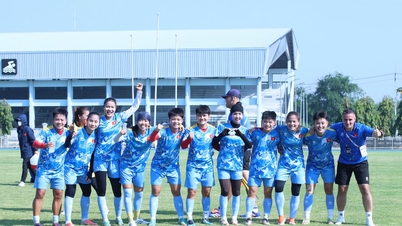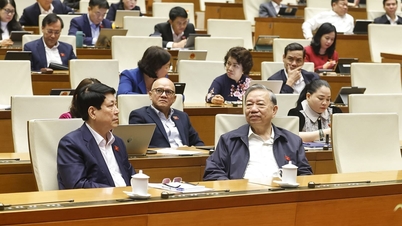Should elementary school students learn about AI?
Currently, public opinion is interested in bringing AI technology into primary school teaching. Notably, there is a proposal by Mr. Truong Gia Binh - Chairman of the Board of Directors ofFPT Corporation, Head of the Private Economic Development Research Department on "popularizing AI" by bringing AI into the education program from grade 1 to realize the goal of Vietnam soon becoming an AI country. A part of parents support the early approach to technology, while many people express concerns about the unforeseen impacts on the development of young children.
Many opinions say that at primary school age (6-10 years old), children are in a period of strong development in creative thinking, communication skills and learning through practical experiences. Early exposure to AI, which is a complex technology, can make children dependent, reduce their ability to think independently and limit their social skills if approached incorrectly. In addition, young children do not have enough foundation to understand the operating mechanism or the consequences of using AI. If not carefully guided, children easily receive information passively, lacking the ability to criticize and verify.
Therefore, teaching AI to primary school students should be approached carefully and selectively. Instead of teaching in depth, many experts believe that we should start with basic skills such as logical thinking, problem solving and technology ethics, while considering the appropriate age to approach AI. AI education should not make children dependent on technology, but should orient AI as a tool to support creativity and learning. It is the responsibility of schools, parents and society to nurture a generation of aware, responsible and humane technology citizens.
Hidden dangers from the trend of learning technology through TikTok
Although AI has not yet been officially included in the general education curriculum, children today can easily access this technology through the Internet and social networks.
Among the platforms, TikTok is becoming a popular “digital classroom” for children, students and young people in accessing new technology knowledge. Videos less than 60 seconds long provide knowledge from programming, AI, design to software usage tips. The concise, intuitive and accessible content makes many children interested in exploring technology without the need for professional background. With the habit of consuming content quickly and flexibly, TikTok has partly replaced the role of traditional books in arousing curiosity.
However, this form of learning also raises many concerns. When knowledge is condensed to fit a short duration, information is easily simplified or misunderstood. Children, with an incomplete cognitive foundation, are easily in a state of "vague understanding", especially with complex topics like AI. In addition, the fact that anyone can post content on social networks makes the quality of information difficult to control. The learning method via TikTok often lacks a clear system and roadmap, leading to knowledge acquisition becoming fragmented and unconnected.
In short, teaching AI to children can be a valuable opportunity to equip future generations with the necessary skills in the digital age. If approached properly, children will not only learn how to use technology effectively, but can also develop critical thinking, creativity and problem-solving skills - important factors that help the country build high-quality human resources in the technology field. Notably, teaching AI to children needs to be placed in an age-appropriate context, with clear orientation and close supervision from parents, schools as well as professional agencies and management agencies.
Source: https://baophapluat.vn/day-tre-em-hoc-ai-co-hoi-hay-moi-lo-tiem-an-post550554.html




![[Photo] National Assembly Chairman Tran Thanh Man attends the VinFuture 2025 Award Ceremony](/_next/image?url=https%3A%2F%2Fvphoto.vietnam.vn%2Fthumb%2F1200x675%2Fvietnam%2Fresource%2FIMAGE%2F2025%2F12%2F05%2F1764951162416_2628509768338816493-6995-jpg.webp&w=3840&q=75)

![[Photo] 60th Anniversary of the Founding of the Vietnam Association of Photographic Artists](/_next/image?url=https%3A%2F%2Fvphoto.vietnam.vn%2Fthumb%2F1200x675%2Fvietnam%2Fresource%2FIMAGE%2F2025%2F12%2F05%2F1764935864512_a1-bnd-0841-9740-jpg.webp&w=3840&q=75)

































































































Comment (0)